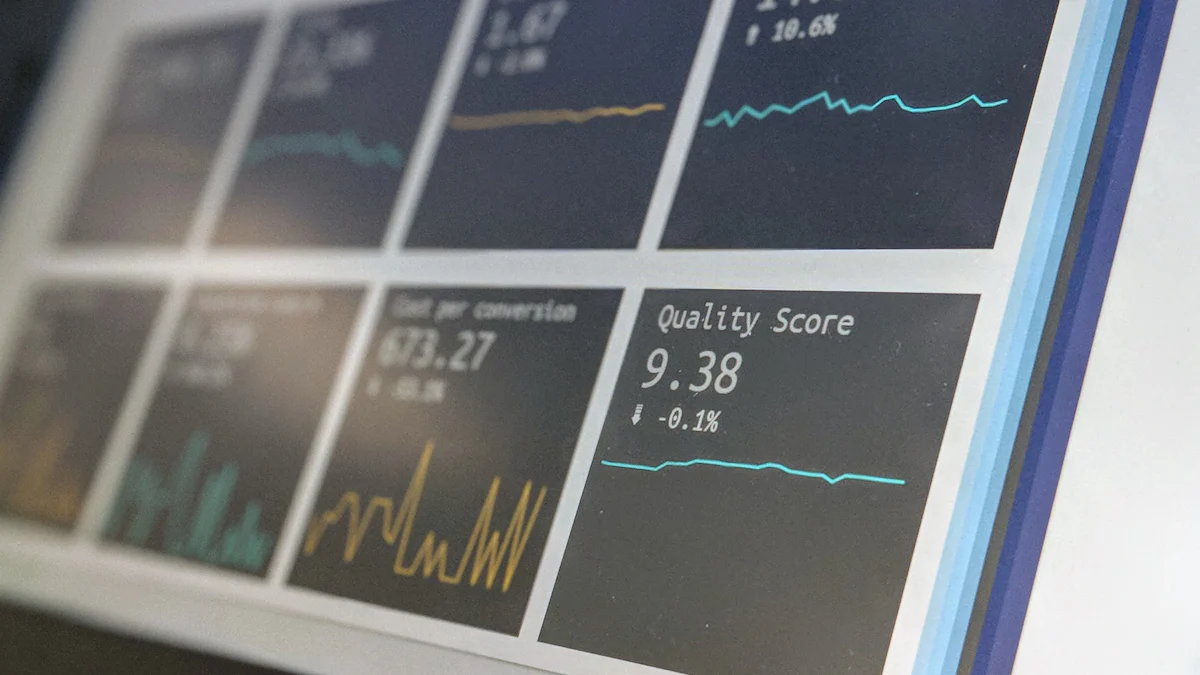BlackRock Interview Guide Analytical vs Technical Approaches
Try Aihirely for
Smarter Interview Prep
Experience real-time AI support tailored to your Resume.
Boost your confidence and ace every question with
AI Mock Interview.

Image Source: unsplash
BlackRock interviews test your ability to solve problems and apply technical expertise. Analytical interviews focus on how you approach challenges and think critically. Technical interviews evaluate your skills in areas like coding, system design, or financial modeling.
You may find the process demanding. Candidates often face multiple rounds, including behavioral and technical evaluations. These stages require you to demonstrate technical skills and communicate your experiences clearly. Expect an initial phone interview, video assessments, and a Super Day with team members or senior leaders.
Understanding the blackrock analytical vs technical interview process helps you prepare effectively and stand out.
Key Takeaways
-
Learn the difference between analytical and technical interviews. Analytical interviews test problem-solving, while technical ones check coding and design skills.
-
Practice for each type of interview. Use case studies for analytical ones and coding sites like LeetCode for technical ones.
-
Know how the interview process works. There are phone calls, video tests, and a Super Day with the team.
-
Prepare based on the job you want. Study finance strategies for finance jobs and coding for tech jobs.
-
Start early and practice often. Spend 4-6 weeks to get ready for all parts of the interview.
Overview of BlackRock Interviews
Purpose of BlackRock Interviews
Why BlackRock uses analytical and technical interviews
BlackRock uses analytical and technical interviews to identify candidates who can excel in their roles. Analytical interviews assess your ability to solve problems and think critically. These skills are essential for addressing complex challenges in the financial industry. Technical interviews, on the other hand, evaluate your expertise in areas like coding, system design, or financial modeling. This ensures you have the technical knowledge required for the job.
By combining these two approaches, BlackRock ensures they hire individuals who can think strategically and execute tasks effectively. This dual focus aligns with their commitment to delivering tailored financial solutions and maintaining strong client relationships.
How these interviews align with BlackRock’s hiring goals
BlackRock’s hiring process emphasizes both technical competency and cultural fit. The firm seeks candidates who not only possess the necessary skills but also align with its values and mission. Analytical interviews help determine if you can approach problems in a structured and logical way. Technical interviews confirm your ability to handle the specific demands of the role. Together, these interviews ensure BlackRock hires professionals who can contribute to their innovative and client-focused environment.
General Structure of BlackRock Interviews
Typical stages of the interview process
The BlackRock interview process typically consists of several stages. Each stage evaluates different aspects of your skills and suitability for the role. Here’s an overview:
| Stage | Description |
|---|---|
| Application | Submit your resume and cover letter through BlackRock’s careers website. |
| Online Assessment | Includes numerical reasoning tests, virtual cover letters, and coding assessments for specific roles. |
| Phone Interview | Initial conversation with HR or hiring manager discussing background and motivations. |
| Video Interview(s) | In-depth discussions on financial knowledge and skills relevant to the role. |
| Super Day Interview(s) | Series of back-to-back interviews with team members and potentially senior leadership. |
| Additional Assessments | May include case studies or presentations related to the financial industry. |
| Offer and Background Check | Job offer contingent on a background check for successful candidates. |
Where analytical and technical interviews fit in the process
Analytical and technical interviews typically occur during the later stages of the process. After initial screenings, you may face these interviews during video assessments or the Super Day. Analytical interviews often focus on your problem-solving approach, while technical interviews test your specific skills. For example, you might analyze a business problem in an analytical interview or write code in a technical one. Understanding where these interviews fit helps you prepare effectively for each stage.
BlackRock Analytical vs Technical Interview: Analytical Interviews

Image Source: pexels
Definition and Purpose
What analytical interviews are
Analytical interviews at BlackRock focus on evaluating how you approach problems and make decisions. These interviews test your ability to analyze data, interpret patterns, and provide actionable insights. They often involve scenarios where you must solve complex business challenges or assess financial risks. BlackRock uses these interviews to understand how you think critically and apply logic to real-world situations.
Why BlackRock conducts analytical interviews
BlackRock conducts analytical interviews to identify candidates who excel in data analysis, portfolio management, and risk assessment. These interviews also evaluate how you integrate technology into investment processes. BlackRock values professionals who can distill complex data into strategic recommendations. Your ability to balance risk and return in asset management and navigate intricate financial models is crucial for success in their roles.
Skills Assessed
Problem-solving and critical thinking
Analytical interviews measure your problem-solving skills by assessing how you identify patterns and form insights. They also evaluate your ability to approach challenges logically and make decisions based on objective information. BlackRock looks for candidates who can assess the impact of their actions and decisions effectively.
Data interpretation and logical reasoning
Your ability to interpret data and draw logical conclusions is another key focus. BlackRock uses structured interview questions to gauge how you analyze information and derive meaningful insights. These skills are essential for making informed decisions in the fast-paced financial industry.
Example Questions
”How would you approach solving a complex business problem with limited data?”
This question tests your ability to think critically and structure your approach. You might need to explain how you would gather relevant information, identify key variables, and propose a solution based on limited resources.
”Describe a time when you had to analyze data to make a decision.”
This question evaluates your practical experience with data analysis. You should describe a specific situation, the steps you took to analyze the data, and the outcome of your decision.
Preparation Tips
Practice case studies and business scenarios
You should focus on practicing case studies to prepare for BlackRock’s analytical interviews. These case studies often test your ability to analyze financial data and make investment recommendations. For example, you might need to evaluate a company’s financial performance and suggest whether to invest in it. BlackRock also includes cold calling case studies for entry-level roles. These scenarios assess how you handle unexpected challenges and communicate effectively under pressure. By working through these exercises, you can improve your ability to think critically and present clear, actionable solutions.
To get started, explore case studies that involve financial modeling or investment strategies. You can find practice materials online or in business-focused publications. Try to simulate real interview conditions by timing yourself and explaining your thought process aloud. This approach will help you build confidence and refine your problem-solving skills.
Develop strong data analysis and interpretation skills
Data analysis plays a crucial role in BlackRock’s analytical interviews. You need to demonstrate your ability to interpret complex datasets and extract meaningful insights. For instance, you might analyze market trends to predict future investment opportunities. Strengthening your data analysis skills will help you stand out during the interview process.
To improve, start by working with datasets in tools like Excel or Python. Practice identifying patterns, calculating key metrics, and visualizing data. Focus on understanding how to turn raw data into actionable insights. You can also review financial reports or market research to sharpen your interpretation skills. The more you practice, the more confident you will feel when faced with data-driven questions.
Use frameworks for structured problem-solving
Using structured frameworks can help you approach analytical interview questions with clarity and precision. Frameworks like SWOT analysis, the 80/20 rule, or decision trees provide a systematic way to break down problems. For example, if asked to solve a business challenge with limited data, you could use a decision tree to evaluate possible outcomes and select the best course of action.
Familiarize yourself with common problem-solving frameworks and practice applying them to different scenarios. Start by identifying the key components of a problem, such as constraints, objectives, and potential risks. Then, use the framework to organize your thoughts and develop a logical solution. This method will not only improve your problem-solving skills but also show interviewers that you can think strategically.
BlackRock Analytical vs Technical Interview: Technical Interviews
Definition and Purpose
What technical interviews are
Technical interviews at BlackRock focus on assessing your expertise in specific technical areas. These interviews test your ability to solve coding problems, design systems, or perform financial modeling. You may encounter tasks that require you to demonstrate your knowledge of programming languages, algorithms, or quantitative analysis. The goal is to evaluate how well you can apply technical skills to real-world challenges.
Why BlackRock conducts technical interviews
BlackRock uses technical interviews to ensure you have the skills needed for technical roles. These interviews help the company:
-
Evaluate your problem-solving abilities.
-
Determine if you align with BlackRock’s core principles.
By conducting these interviews, BlackRock ensures you are ready to handle the technical demands of the role. For example, coding assessments test your programming knowledge and problem-solving skills. These assessments often last up to 90 minutes and include six coding questions. This process ensures you possess the skills required for success in technical positions.
Skills Assessed
Coding and programming skills
BlackRock evaluates your ability to write efficient and accurate code. You may need to solve algorithmic problems or debug existing code. These tasks test your understanding of programming languages and your ability to think logically.
System design and architecture
System design questions assess your ability to create scalable and efficient systems. You might need to design a system for portfolio management or optimize an existing architecture. These tasks test your understanding of system components and how they interact.
Financial modeling and quantitative analysis
For roles in finance, BlackRock tests your ability to build financial models and analyze quantitative data. You may need to evaluate investment strategies or assess market risks. These tasks require strong analytical and mathematical skills.
Example Questions
”Write a function to reverse a linked list.”
This question tests your coding skills and understanding of data structures. You need to write a function that reverses the order of nodes in a linked list. Your solution should be efficient and demonstrate your ability to handle edge cases.
”How would you design a scalable system for portfolio management?”
This question evaluates your system design skills. You need to propose a solution that can handle large amounts of data and adapt to changing requirements. Your answer should include details about architecture, scalability, and performance optimization.
Preparation Tips
Practice coding problems on platforms like LeetCode or HackerRank
You should dedicate time to solving coding problems on platforms like LeetCode, HackerRank, or CodeSignal. These platforms offer a wide range of challenges that mirror the types of questions you might encounter during BlackRock’s technical interviews. Focus on topics like data structures, algorithms, and problem-solving techniques. Start with beginner-level problems to build confidence, then gradually move to more advanced challenges.
Consistency is key. Set aside time daily to practice coding. For example, tackle one problem each day and aim to improve your solution’s efficiency. Pay attention to edge cases and test your code thoroughly. This habit will sharpen your logical thinking and help you write clean, optimized code during the interview.
Review system design principles and financial modeling techniques
System design questions require a solid understanding of foundational concepts. Study topics like network protocols, databases, and load balancing. These areas form the backbone of scalable and efficient systems. Use a repeatable framework to approach system design questions. For instance, start by clarifying requirements, then outline the system’s components, and finally address scalability and performance.
To prepare effectively, explore a mix of written guides and video tutorials. Resources like “Grokking the System Design Interview” or YouTube channels dedicated to system design can provide valuable insights. Practice designing systems for real-world scenarios, such as portfolio management tools or trading platforms. For financial modeling, focus on building models that analyze investment strategies or assess market risks. Use tools like Excel or Python to refine your skills.
Brush up on relevant technical tools and programming languages
BlackRock values candidates who are proficient in tools and languages relevant to their roles. Identify the technologies most commonly used in your target position. For example, roles in software engineering may require expertise in Python, Java, or C++. Financial roles might prioritize tools like MATLAB, R, or SQL.
Spend time revisiting the basics of these tools. Write small programs or scripts to reinforce your knowledge. If you’re unfamiliar with a specific tool, take online courses or tutorials to get up to speed. Platforms like Coursera, Udemy, or free resources like W3Schools can help you learn quickly. By mastering these tools, you’ll demonstrate your technical readiness and adaptability during the interview.
Tip: Combine your technical knowledge with practical applications. For instance, use Python to analyze financial datasets or SQL to query large databases. This approach will showcase your ability to apply technical skills to real-world problems.
Key Differences Between Analytical and Technical Interviews

Image Source: unsplash
Comparison Table
Side-by-side comparison of purpose, skills assessed, and question types
The table below highlights the key differences between analytical and technical interviews at BlackRock. Understanding these distinctions will help you tailor your preparation effectively.
| Aspect | Analytical Interviews | Technical Interviews |
|---|---|---|
| Purpose | Evaluate problem-solving, critical thinking, and decision-making skills. | Assess technical expertise in coding, system design, or financial modeling. |
| Skills Assessed | Logical reasoning, data interpretation, and strategic thinking. | Programming, quantitative analysis, and system architecture. |
| Question Types | Scenario-based questions like solving business problems or analyzing data. | Practical tasks such as writing code, designing systems, or building financial models. |
When to Expect Each Type
Roles that typically involve analytical interviews
You can expect analytical interviews if you apply for roles like Analyst or Associate at BlackRock. These positions require strong analytical skills for tasks such as financial analysis and investment strategy development. Analytical interviews assess your ability to think strategically and make informed decisions. For example, as an Associate, you may need to analyze financial data and support client relationships. These responsibilities demand a structured approach to problem-solving, which is why BlackRock emphasizes analytical interviews for these roles.
Roles that typically involve technical interviews
Technical interviews are common for roles in software engineering, portfolio management, and other technology-focused positions. These interviews test your ability to handle tasks like coding, system design, and data analysis. For example, software engineering roles require proficiency in programming languages and algorithms. Portfolio management positions demand a strong understanding of financial markets and investment strategies. BlackRock uses technical interviews to ensure you have the skills to innovate and deliver client-focused solutions.
Tip: If you’re targeting a technical role, focus on mastering tools and techniques relevant to the position. This will demonstrate your readiness to tackle real-world challenges.
Analytical interviews test your ability to solve problems and think critically. Technical interviews focus on your expertise in coding, system design, or financial modeling. Understanding these differences helps you prepare effectively.
Tailor your preparation to the role you want. For financial roles, study investment strategies and market trends. For technology roles, practice coding and system design. Use the STAR method for behavioral questions. Research BlackRock’s investment philosophy and highlight relevant skills in your resume. By aligning your preparation with the role, you increase your chances of success.
Tip: Start early and practice consistently to build confidence!
FAQ
1. How can you identify whether a role at BlackRock involves analytical or technical interviews?
Review the job description carefully. Analytical roles often mention problem-solving, data analysis, or strategic thinking. Technical roles highlight skills like coding, system design, or financial modeling. Research the position’s requirements to determine the interview type.
2. What is the best way to prepare for BlackRock’s analytical interviews?
Practice solving case studies and analyzing business scenarios. Focus on improving your data interpretation and logical reasoning skills. Use structured frameworks like SWOT analysis or decision trees to approach problems systematically. This preparation will help you think critically during the interview.
3. Are technical interviews only for software engineering roles?
No, technical interviews also apply to roles in portfolio management, quantitative analysis, and financial modeling. These interviews assess your ability to handle technical tasks like coding, system design, or building financial models. Tailor your preparation to the specific technical skills required for the role.
4. How much time should you dedicate to preparing for BlackRock interviews?
Allocate at least 4-6 weeks for preparation. Spend time daily practicing coding problems, reviewing case studies, or refining your problem-solving skills. Consistency is key. Break your preparation into manageable tasks to cover all aspects of the interview process effectively.
5. What resources can help you prepare for BlackRock’s technical interviews?
Use platforms like LeetCode, HackerRank, or CodeSignal for coding practice. Study system design principles through resources like “Grokking the System Design Interview.” For financial modeling, explore Excel tutorials or Python-based data analysis guides. These tools will strengthen your technical expertise.
Tip: Stay consistent and focus on understanding concepts rather than memorizing answers. This approach will boost your confidence during the interview.
